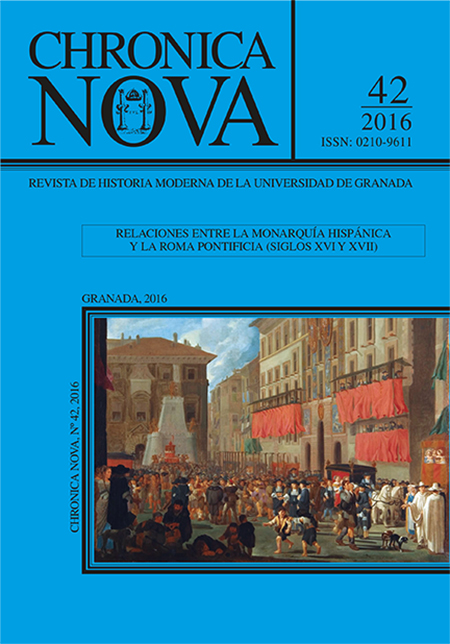Problematic Interactions. Spanish “Theological” Diplomacy and Roman Curia in the Genesis of the Alexander Vii’s Bulla "Sollicitudo (1661)"
DOI:
https://doi.org/10.30827/cn.v0i42.5179Keywords:
Roman Catholic Church, Papacy, Spanish Monarchy, Theology, Immaculate Conception, Diplomacy, AmbassadorsAbstract
In the first half of the Seventeenth century the Spanish Monarchy employedmassive diplomatic energies towards the Holy See in favour of the dogmatic definition of the Immaculate Conception of the Virgin. In particular, starting from the pontificates of Urban VIII and Innocent X, the article analyses the path that led to the emanation of the Papal bull "Sollicitudo omnium Ecclesiarum" (1661, under Alexander VII). In the two decades here examined it appears clear both the ductility of the indications that Philip IV gave to his extraordinary ambassadors, and the importance of the political and ecclesiological implications of the arguments used by the Habsburg Monarchy in favour of the proclamation of the dogma: the concept of orthodoxy, the role of the general council, the uniformity of liturgy, cults and devotions within the catholicity, the possibilities of intervention of the secular powers in matters of doctrine.
Downloads
Downloads
Published
How to Cite
Issue
Section
License
Nuestra revista se atiene a las recomendaciones para la implementación del Artículo 37 Difusión en Acceso Abierto de la Ley de la Ciencia, la Tecnología y la Innovación:
- Los/as autores/as cuyas contribuciones sean aceptadas para su publicación en esta revista conservarán el derecho no exclusivo de utilizar sus contribuciones con fines académicos, de investigación y educativos, incluyendo el auto-archivo o depósito de los artículos aceptados en repositorios institucionales o temáticos de acceso abierto de cualquier tipo en un plazo máximo de seis meses.
- Preferiblemente se permitirá el uso de la versión publicada de las contribuciones científicas, que estarán accesibles en abierto tan pronto como sea posible.
-
Que en caso de que el trabajo sea aprobado para su publicación, el/la autor/a autoriza de manera ilimitada en el tiempo a la entidad editora para que incluya dicho texto en Chronica Nova y pueda reproducirlo, editarlo, distribuirlo, exhibirlo y comunicarlo en el país y en el extranjero por medios impresos, electrónicos, CD, Internet o cualquier otro medio conocido o por conocer.






 ISSN-e: 2445-1908
ISSN-e: 2445-1908










